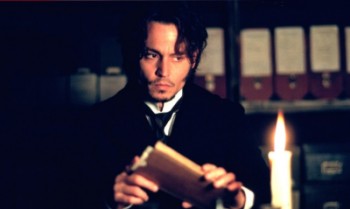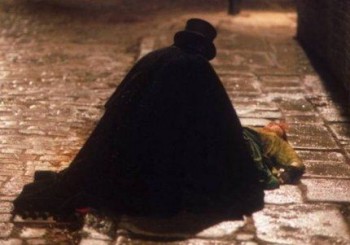|
The film version of From Hell was adapted by the Hughes brothers, working from comic author extraordinaire Alan Moore's lengthy and intricate graphic novel of the same name, which chronicled the events surrounding the Jack the Ripper murders in 1888. A little backstory might prove helpful here:  From Hell began life as a fourteen-issue comic series by Alan Moore and Eddie Campbell, which was eventually compiled into one pretty heavy graphic novel. Boasting an almost preposterous amount of knowledge on Ripper lore (the annotations attached to each chapter can end up being significantly longer reads than the chapters themselves,) the story manages to include pretty much every verifiable fact concerning the crimes, filled in between with various speculations or theories, and finally glazed with healthy doses of fiction and outright magical interpretations. Moore's final appendix indicates quite clearly that he has no illusions about the veracity of the novel's interpretation of the events, nor does he propose that anything akin to an "answer" to the mystery is even possible. From Hell is less about the Ripper specifically, and more a meditation on the development of urban legends and the public's long-standing fascination with serial killers. Hence, the bulk of the narrative is drawn from Stephen Knight's 1976 book Jack the Ripper: The Final Solution, one of the most thoroughly discredited theories on the case, though simultaneously one of the most dramatically appealing. Based upon a story related to Knight by Joseph Sickert, supposedly the son of nineteenth-century painter Walter Sickert, Final Solution was first embraced wholeheartedly by the public, and then derided en masse after Joseph Sickert publicly stated that he had invented the entire account. This is hardly surprising, since Knight's book went beyond Joseph's story to eventually implicate Walter Sickert himself as co-conspirator, but knowing the motive for Sickert's retraction of the tale doesn't really speak to its likelihood of authenticity one way or the other. It was a given that this wealth of detail, historical and otherwise, wasn't going to survive a transition to film without significant attenuation, but initial glimpses at what might be in the offing weren't terribly promising, specifically in regards to the theatrical trailer, which was edited by someone with a desperate need to be shot. Aside from heavily playing up the romance between Inspector Abberline (real-life investigator assigned to the Ripper case) and Mary Kelly (real-life final victim,) a minor point which commanded about six whole pages in the novel, the trailer was cut to a goddamn Marilyn Manson song for no intelligent reason. The prospect of some hip, trendy, goth-metal ridden version of a period drama put me off to seeing the film for quite some time, but when I eventually got around to it, I was quite pleased to find that the actual soundtrack was done in a classical style, with the aforementioned song being relegated solely to the latter half of the ending credits. Structurally, the film is very different from the novel, which is far more concerned with the Ripper (whose identity is known from the very beginning) and his increasing madness. The film shifts the focus to Abberline and his investigation, with the killer's identity kept secret until the end. The plot revolves around the same conspiracy theory, though a greatly simplified version thereof, and adds some new characters as red herrings whilst deleting some others. Some, such as alleged psychic Robert Lees, who claimed to have led the police to the killer's door, were conflated with other characters; Abberline now has precognitive visions of the crimes, though the Lees character is clearly established as a fraud in the book version. The only character from the novel portrayed as having genuine visions is the Ripper himself, whose glimpses of the future grow more vivid with each murder; hence the somewhat unexplained (and invented) line wherein the killer claims to have given birth to the twentieth century. The film also plays more loosely with the known facts, such as particular details of Abberline's life and death and the distribution of the bodies. At other points, the dialogue and even the shot framing seem to come right off the page. It is almost certainly the most authentic movie made on the subject thus far, despite its clearly fictionalized conclusion.  Johnny Depp is great, as usual; ditto to Ian Holm as physician Sir William Gull. Heather Graham is, well, Heather Graham. She's not as bad in this as I would've expected her to be, but she has the same fish-out-of-water feel as Keanu Reeves in Bram Stoker's Dracula. I'd have far rather seen someone like Kate Winslet in the role, though even having Heather appear with slightly mussed hair and an unwashed countenance would've helped. That misstep aside, Peter Deming's cinematography is beautiful, even whilst simultaneously conveying the squalid conditions of late nineteenth century London. The script by Rafael Yglesias, if mostly discarding the in-depth look into the psychology of serial killers, does retain the graphic novel's focus on the class division of the times, the ethnic schisms of London's underclass, and the hypocrisy of a society that sneers at the lowliness of prostitutes whilst simultaneously creating the economic conditions that forced women into such roles in the first place. And the unlikely romance between cop and hooker, while only a tangential point in the books, actually works fairly well, evoking a feel of the epic works of old Hollywood. If the shift in focus gives the film something of a Hollywood middle, it does avoid the cliché of a Hollywood ending, which earlier versions of the screenplay had been steering towards. It's clear that the Hughes brothers had a great admiration for the book, as they tried to squeeze many of its most memorable beats back in whenever possible. In some points, however, these are so fleeting as to be almost confusing; I'm at a loss as to say whether one should read the book before seeing the movie or not. Reading it will totally kill any sense of "whodunit" present in the film, but it also makes the film easier to follow, so flip a coin. Still, given the role of the Freemasons in the plot, I must say that it was probably an error in judgement to delay use of the actual word "Freemason" until very near the end. I'm not sure how many average Americans recognize Masonic iconography or rituals on sight. Nevertheless, these are mostly minor quibbles, and I do recommend the film. If not a perfect evocation of Moore's rather epic work, it is still a very enjoyable and stylish thriller. It's also far less disturbing than the book; whether or not this is a pro or a con depends upon the constitution of your stomach. -review by Matt Murray P.S. The DVD commentary track is rather interesting, and the last ten minutes or so consist of Albert Hughes discussing in great detail why he thinks Hollywood sucks ass.
|
|
||||||||